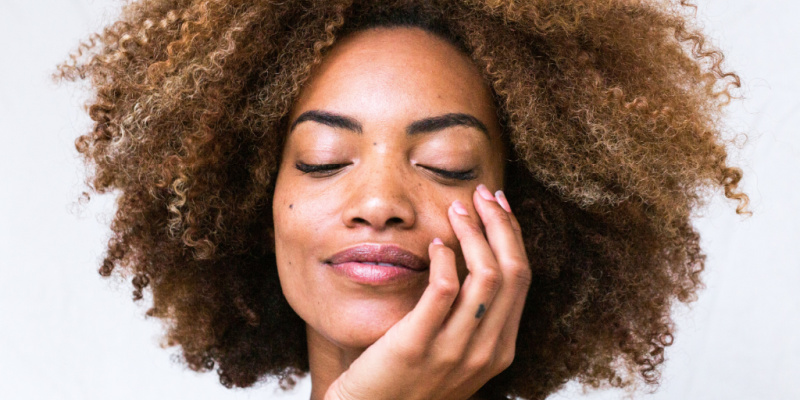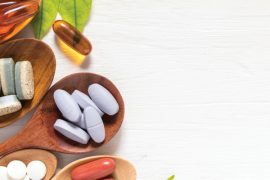Photo by Park Street on Unsplash
A vast menu of products from a vast menu of brands makes it difficult to determine what we should be using in which stage of life, and that’s why we spoke with dermatologist Brittany Buhalog at SSM Health.
She gets in to all the specifics, like “Do I really need that Vitamin C serum?” and “Do I have to wear SPF if I’m just walking to my mailbox? The answer is yes and yes.
This is really your guide to your healthiest skin, along with myth-busted misconceptions. However, Buhalog is not intending to offer blanket medical advice. Consult your doctor on options that are best suited for you.
Skincare Through the Decades
Attention All: Let’s Start with SPF
“Everyone should be using a sunscreen every single day — rain or shine, summer or winter,” Buhalog says. “I recommend at least SPF 30, and reapply it you’re going to be outdoors for more than 90 minutes or if you’re sweating/swimming and the product is physically removed from your face. I prefer lotions to sprays, but again, as long as you’re getting SPF on your skin, I’m happy!”
In general, she recommends reapplying every few hours — in the morning, at lunch and before commuting home, for example. And no skimping! When applying to your whole body, you’ll need about one shot-glass-worth of SPF and a teaspoon amount for your face.
Favorites: Neutrogena Sensitive Skin Liquid Sunscreen, EltaMD UV Daily, SkinCeuticals Physical Fusion UV Defense Sunscreen, Neutrogena Hydro Boost (budget-friendly option for your body).
When Reapplying on Your Face: Supergoop Defense Refresh (Re)setting Mist, Neutrogena Ultra Sheer Face Mist Sunscreen, Physicians Formula Talc-Free Mineral Airbrushing Pressed Powder SPF 30 and Colorescience Brush-On Powder Sunscreen
In your 20s
“This is a good time to establish good routines and healthy skin practices, as well as treat some common skin conditions, such as acne.”
No. 1: Antioxidants
As you get older, sun damage often reveals itself as spots and wrinkles. Vitamin C antioxidants can help combat that. Antioxidants can be pretty expensive, because “the ingredients needed to keep the formula stable and effective are also expensive,” she says. Buhalog recommends investing in this product and saving cash on budget-friendly cleansers and moisturizers.
Favorites: SkinCeuticals C E Ferulic, Paula’s Choice C15 Super Booster and Mad Hippie Vitamin C Serum
No. 2: Acne Treatment
Several over-the-counter products can help treat skin prone to breakouts, such as the retinoid adapalene, which unclogs pores and prevents breakouts. Buhalog recommends Differin gel and Effaclar. Sulfur soaps and benzoyl peroxide — like Grandpa’s sulfur soap or one of PanOxyl’s cleansers — are also great for acne-prone skin. “Effaclar Duo also contains benzoyl peroxide and is available at most drug stores,” she says.
In Your 30s and 40s
“Many women in their 30s and 40s start to notice the effects of cumulative UV radiation over the past few decades,” Buhalog says, “which manifests as sunspots and uneven skin tone.”
Add a product that contains azelaic acid — Buhalog likes The Ordinary and Paula’s Choice — which help even out your complexion. Want a heavy hitter? Buhalog recommends a dermatologist prescribed azelaic acid or retinoid. Be cautious of Hydroquinone, as it can result in paradoxical hyperpigmentation if used long-term, she says. So, talk to your doctor beforehand.
In Your 50s and 60s
Wrinkles, sunspots and the feeling of sagging skin are normal and expected changes to skin during these years of life.
“Just like the bones in your body change over time, the facial bones do the same as well (generally losing density and shifting downward),” Buhalog says. “which can result in changes to the overall facial shape, appearance and structure.”
No. 1: Know Your Skin
“New ‘moles’ are not common during this time in life, and any new pigmented lesion should be brought to your dermatologist’s attention,” she says. If a lesion or bump is bleeding, growing or changing, talk to your doctor as it could be indicative of skin cancer.
No. 2: Moisturize
Over time, skin starts to lose its natural moisture, so be sure to regularly use a gentle lotion. For an added dose of hydration, oils including jojoba and apricot kernel can especially help during colder months or for those with dry skin.
Favorites: CeraVe PM Moisturizing lotion, Cetaphil Daily Moisturizer, SkinCeuticals Triple Lipid Restore
No. 3: Minimally Invasive Procedures
Botox and Dysport can soften the appearance of wrinkles, for those who are unhappy with them. They can smooth your forehead and lift your brows and the corners of your mouth into a more youthful shape. Also, injectable hyaluronic acid products (Juvéderm and Restylane) or biosynthetic options (Scupltra) can add fullness to the face where bone structure was lost due to aging.
Talk to your physician beforehand to understand the risks and ensure the procedures are done by a professional, she says.
Myth-Busters: The Skincare Edition
“I only need to wear sunscreen when I’m out in the sun.”
False! You get tons of cumulative sun exposure throughout the day, and all of that ultraviolet radiation adds up. When you’re driving, walking to the mailbox, walking to your car in a parking lot, all of that time outside is time exposing your skin to ultraviolet rays.
“I must have a complicated, 12-step skincare routine in order to have great skin.”
False! I keep my skincare routine and my recommendations to patients as a very simple, three-step routine both morning and night. Cleanse your skin, apply a treatment product based on your concerns (acne, hyperpigmentation, etc), and apply SPF during the day or moisturizer at night. That’s it.
“It’s important to get a base tan before going on vacation.”
Nope. That base tan is still acquired after your skin has endured ultraviolet radiation from the sun. While it is true that getting intense, blistering sunburns raises your risk of getting skin cancer, chronic UV exposure can also lead to DNA damage and mutations that cause skin cancer. A spray tan looks nearly the same and doesn’t subject your skin to damaging UV rays. Use good sun protective clothing, hats, and SPF when on vacation rather than opting to get a tan.
“Botanical and all-natural products are better for me than conventional ones.”
It depends. If you are someone who suffers from eczema or other inflammatory skin conditions, many of the plant-based products can actually be harsher on your skin than conventional ones. They can contain plant proteins and peptides that are highly allergenic to some people — think: Poison ivy is 100% plant-based and 100% allergenic. So, if you are someone with sensitive skin who is prone to irritation, then botanical products may not be the best choice for you. Consult your dermatologist for recommendations about gentle products that are meant for sensitive skin.
“The price of the skincare product reflects how good it is.”
Again, false! Just like many industries, branding, packaging and advertising in skincare is huge. It’s one of the most profitable industries right now, and that’s all thanks to creating a buzz around products. Many active ingredients and formulas are consistent among many brands and products, and the price is just a reflection of the branding.
Find more health tips from SSM Health here.





Comments are closed.